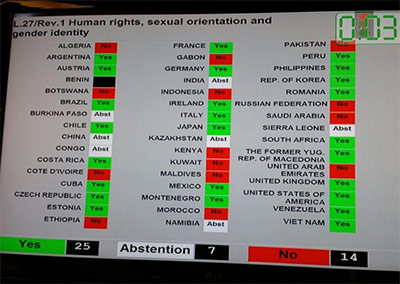SOUTH AFRICA VOTES ‘YES’ FOR GLOBAL LGBT EQUALITY
 The South African government has stuck to its constitutional commitments and voted in favour of another ground-breaking resolution on sexual orientation and gender identity at the UN Human Rights Council (UNHRC).
The South African government has stuck to its constitutional commitments and voted in favour of another ground-breaking resolution on sexual orientation and gender identity at the UN Human Rights Council (UNHRC).
On Friday afternoon, the country was the only African nation in Geneva to say “yes” to resolution A/HRC/27/L.27/Rev.1, condemning violence and discrimination on the basis of sexual orientation and gender identity.
The resolution, which was sponsored by Brazil, Chile, Colombia and Uruguay, also asks the High Commissioner for Human Rights to update a 2012 report on violence and discrimination on the basis of sexual orientation and gender identity. It further states that the new report should aim to share “good practices and ways to overcome violence and discrimination.”
The original 2012 report came about after South Africa co-sponsored the first ever landmark resolution passed by the council on discrimination on the basis of sexual orientation and gender identity in 2011.
There had been fears that this time round South Africa would either abstain during Friday’s vote or support proposed amendments by anti-gay countries during the vote to weaken the resolution.
Thankfully, it did neither and instead was among the 25 nations that voted in favour of the resolution. There were 14 that voted against it and 7 abstained.
Ambassador Abdul Samad Minty from South Africa told the UNHRC that “no person should fear for their safety or be deprived of their dignity because of their sexual orientation or gender identity.” He explained that the country’s vote was “guided by the principle of supremacy of the South African Constitution and the rule of law” that enjoins the government “to promote and respect the rights of all people without distinction of any kind.”
Minty said that, “The South African government believes that we as a country will benefit from a best practice report as called for in the resolution.” He also acknowledged that, “despite our enabling laws, people in our country are still subjected to discrimination and violence based on their sexual orientation and gender identity. The essence of this resolution is to help us all understand that we can do better to protect the lives and dignity of all our citizens.”
Minty added: “The spirit of this resolution is in stark contrast to the unhelpful and divisive use of development aid by some countries as a means to shift policies and laws in a select number of countries.”
South Africa’s vote followed a passionate campaign by human rights groups in the country and around the world, which included social media messaging and letters to the government, urging it to vote in favour of the resolution.
South African LGBTI group Iranti-org welcomed South Africa’s vote, saying: “We are proud that the South African Government remains committed to upholding the human rights contained in our Constitution.”
Less encouragingly, Buzzfeed reported that activists close to negotiations in Geneva claimed that South Africa “had helped water down the resolution before the vote,” changing the original version that called for a report every two years to one that only asked for another once-off report.
Groups across the globe applauded the adoption of the resolution. “The Human Rights Council resolution is a significant moment for global LGBTI movements, and for people around the world who have worked tirelessly for human rights for everyone,” said Monica Tabengwa, LGBT rights researcher and an ILGA Board Member, Kenya. “We intend to press the Council to keep these concerns atop its agenda, and ensure sustained attention and action.”
The countries that opposed the resolution all claimed to be against violence against any persons but insisted that it was necessary to respect the religion, history, culture and background of each state. They also claimed that focusing on LGBT people separately was creating new kinds of rights that did not form part of international law.
In the run up to the vote, progressive countries, including South Africa, were able to successfully fend off seven proposed hostile amendments, introduced by Egypt, that sought to remove all references to sexual orientation and gender identity from the resolution.
Leave a Reply